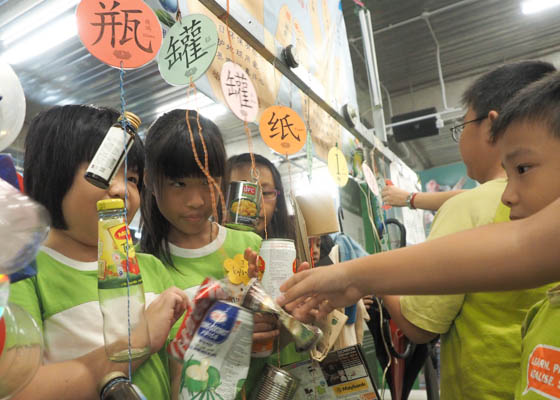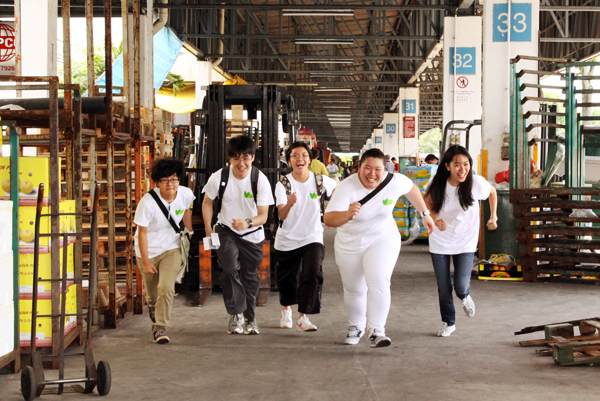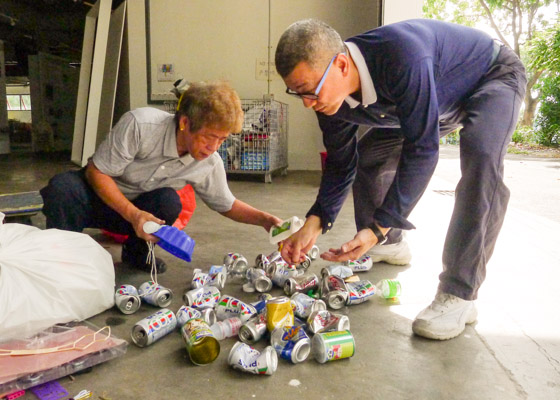
Volunteers sorting recyclables with residents who live in the vicinity of block 256. (Photo by Dai Wei Xian)
On the morning of 12 June 2016, when many residents were still deep in slumber, 32 Tzu Chi volunteers were cheerily arranging posters, putting the various types of recycling bags in place and setting up a refreshment zone at the void deck of Block 256 in Pasir Ris. When the hands of the clock finally showed it was 9am, the new recycling point was all ready for its official opening.
“Today is a public holiday so please keep the volume low so as not to disturb residents who may be resting at home!” Yang Han Qin did not forget to give a gentle reminder to those present. Yang and other volunteers had managed to visit 557 households over two days in May and June, to inform them of the opening of the new recycling point.
They had given out pamphlets and explained what was recyclable and what was not to the residents, encouraging them to reduce their consumption of resources in daily life. Many residents had responded and had turned up for the opening, sorting the “rubbish” together.
Age is Not a Barrier in Recycling
Beside a row of coconut trees under the void deck, volunteers would look up occasionally and encouraged residents to join them in sorting recyclables even as they were hard at work.
At another corner, volunteers took the opportunity to share with others the recycling philosophy of Tzu Chi; by explaining what could be recycled and what could not, they hoped to raise the level of environmental consciousness among the community.
Grandma Lin, aged 82, who lives in one of the units above, was taking an early morning stroll under the block. Seeing her interest piqued by their activities, volunteers immediately invited her to join in. Grandma Lin was delighted after hearing the latter speak about the concept and practice of recycling. She was pleased to learn that by joining in the monthly recycling activities, she would be making good use of time.
As she sat on a stool bent over sorting paper, her face was wreathed in smiles. She was so absorbed in the task that she only noticed that her back was aching when she tried to stand up. Volunteers quickly rushed to help her when they saw her difficulty, massaging her back and legs to help relieve her pain. They supported her as she walked and then gave her a cup of hot beverage.
Apart from the elderly, there were young parents who brought their children along to learn about recycling. Volunteer Chen Si Zu and his wife brought along their two children (aged three and one) to the recycling point, hoping that they would learn to cherish what they have and not to be wasteful. His wife said, “We hope to teach our children the concept of recycling starting from within the family, and let them know that that because many things are thrown away (as trash), we should try to have less desires and wants.”
Green Hands Make Recycling a Part of Life
“Water that has been used to wash rice (can be used to) water plants. (In this way,) we can save water resources and nurture the earth at the same time. We can also wash toilets with used laundry water. Plastic bottles with holes drilled into their caps can be used as self-watering devices, so there’s no need to worry even if you’re away for a few days!“ Liu Miao Xiang cheerily shared a few tips of her own with others as she sorted out paper.
Liu has many such tips to share as she has accumulated them over ten years. When Tzu Chi Singapore’s Jing Si Hall opened in Pasir Ris, she would regularly bring recyclables to deposit at its educational recycling station, which was located at the back of the building. When the station was closed in 2011, Liu then brought the items to the community recycling point at Block 608. By then, she was already a volunteer and would participate in Tzu Chi’s recycling activities.
After receiving an SMS from another volunteer and finding out that there was now another new recycling point, Liu was pleased to note that being just 15 minutes by foot from her home, it was in a convenient location.
Huang Bing Tian, the chair of Pasir Ris RC Zone 9, had known of Tzu Chi when he was in Taiwan. In December 2015, he was invited to attend the Sungei Api Api recycling exhibition held outside the Jing Si Hall. After hearing the explanations by volunteers and reading the recycling posters on display, he started thinking about establishing a recycling point in his neighbourhood. At a grassroots meeting, he got to know of the other RCs declining Tzu Chi’s application to set up a recycling point and decided that he would invite the organization to open one himself.
Huang hoped to let the residents know that recycling can be part of life and suggested that the point should be set up at Block 256 as there were comparatively more charity volunteers in the vicinity. The residents in the area also had a higher level of environmental awareness and knew how to give discarded items a new lease of life by re-working them into musical instruments and Christmas trees. The RC there also had plans to have students help deliver the recyclable materials collected from residents living further away to the designated point.
“Though the majority of the residents have some recycling knowledge, they don’t know where to start. Partnering with Tzu Chi to conduct recycling activities is a more effective way. In addition, Tzu Chi emphasizes educating the public so that they would understand the importance of recycling and how to sort recyclables,” he said.
When the event ended around noon (after the recycling merchants had carted away the materials), Tzu Chi volunteers took out their eco-friendly utensils and invited residents to enjoy a vegetarian lunch with them. In this way, they hoped to give impetus to the vegetarianism and recycling movements, that everyone can reduce their carbon footprints in daily life.
On 13 May 2016, 44 volunteers gathered for a briefing before heading out to the nearby blocks to spread the word about the new recycling point. (Photo by Wu Nan Kai)
Over two days in May and June, volunteers visited 557 families in the neighbourhood to spread word about the new recycling point. (Photo by Wu Nan Kai)
On the morning of 12 June 2016, volunteers put up posters and made preparations for the opening of the recycling point. (Photo by Teoh Moh Sang)
The new recycling point is situated at the void deck of Block 256 in Pasir Ris. (Photo by Teoh Moh Sang)
Volunteers educate members of the public on the type of items that can be recycled. (Photo by Teoh Moh Sang)
Volunteers giving Grandma Lin, who was helping to sort recyclables, a massage to relieve her aches. (Photo by Teoh Moh Sang)
Li Mei Shan (first from left) and her husband Chen Si Zu (first from right) brought their two young children to the recycling point to teach them the importance of cherishing the things they have. (Photo by Dai Wei Xian)

Liu Miao Xiang (right) has been engaged in Tzu Chi’s recycling activities for the past 10 years and has numerous tips to share. (Photo by Teoh Moh Sang)
On the launch day, RC chair Huang Bing Tian (left) attended the event in person and is seen here with volunteer in charge of the recycling point Yang Han Qin. (Photo by Teoh Moh Sang)



